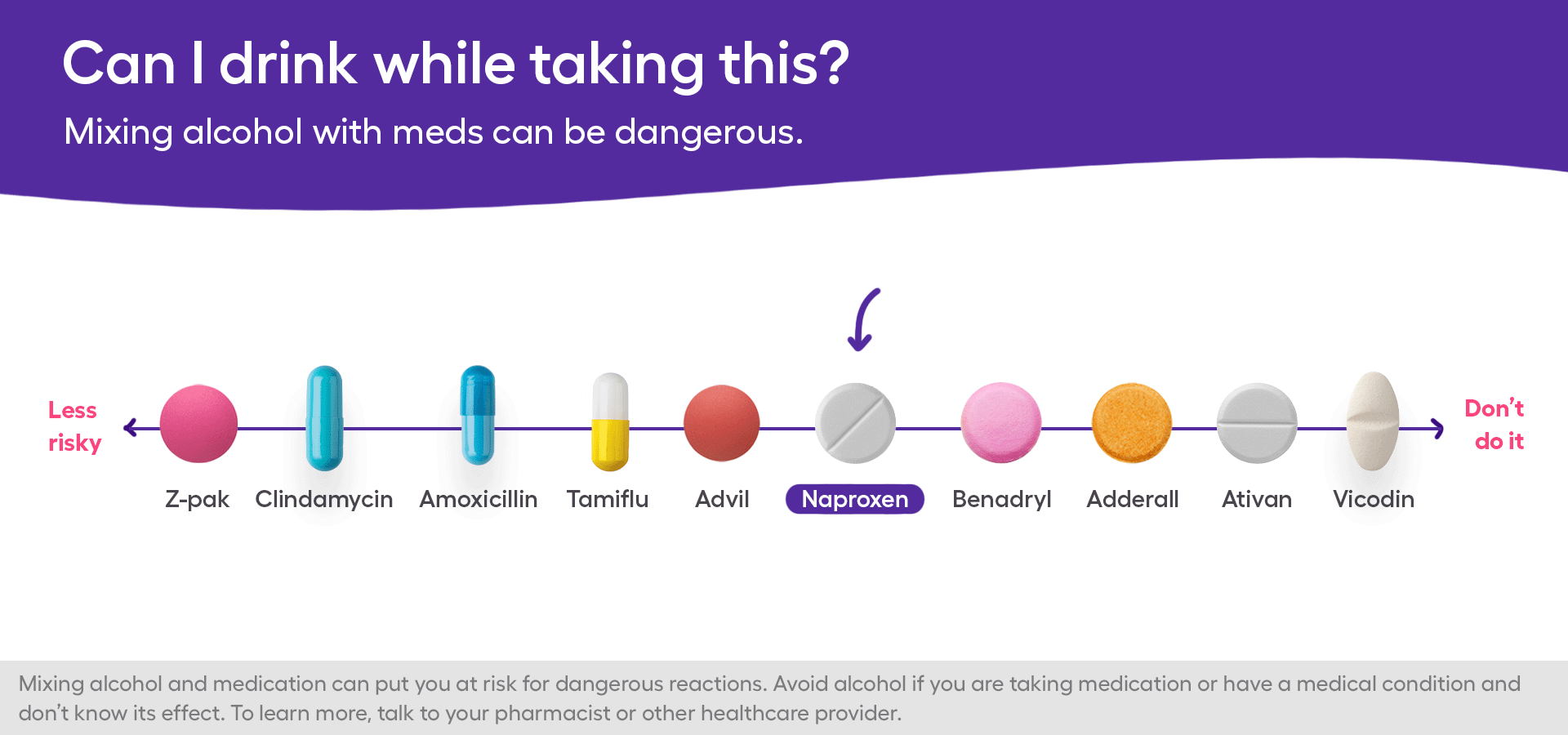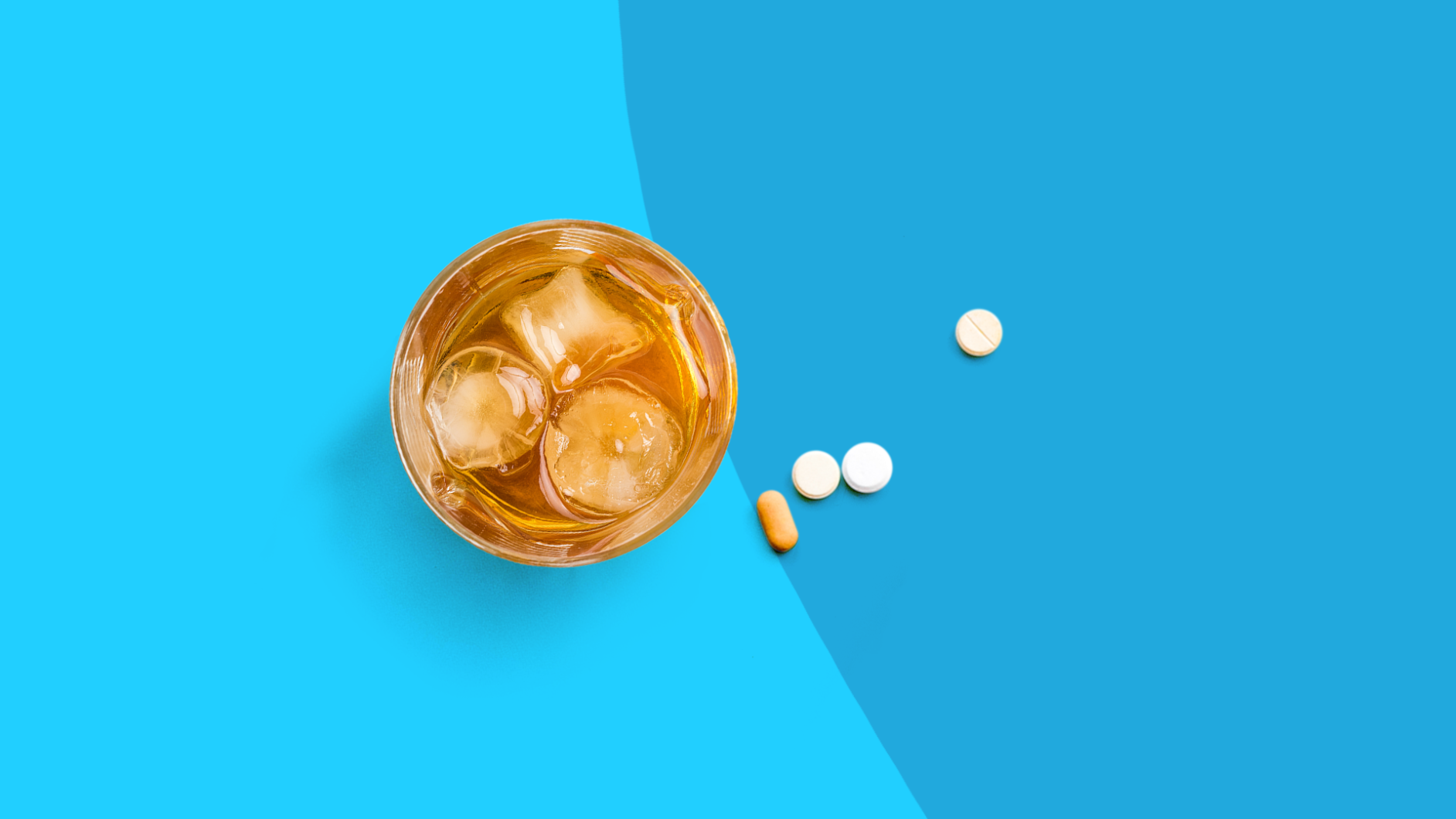Naproxen is a popular over-the-counter (OTC) drug that relieves pain and reduces inflammation. It’s a standard treatment for headaches, muscle pain, toothaches, and even temporary fevers. While many people may experience pain relief using naproxen, the question often arises as to whether or not drinking alcohol is safe while taking it.
The risks of mixing alcohol and naproxen can depend on the amounts of alcohol and naproxen consumed. However, the simple answer is that mixing the two is not generally recommended. Combining these substances may lead to increased risks and potentially dangerous side effects. NSAIDs, like naproxen, can cause higher risk of stomach bleeding and ulcers, and long-term alcohol consumption has been shown to amplify that risk.
Continue reading to learn more about the safety concerns of drinking while on naproxen.
What is naproxen?
Naproxen is a nonsteroidal anti-inflammatory drug (NSAID), the same class of drugs as ibuprofen. It treats pain and inflammation caused by various conditions, including headaches, arthritis, ankylosing spondylitis, tendinitis, and gout. It is available under several brand names, including Aleve, Naprosyn, Anaprox, and Flanax.
NSAIDs work by blocking the effects of cyclooxygenase (COX) enzymes, which are responsible for producing prostaglandins. Prostaglandins can elevate body temperature and make nerve endings more sensitive to pain signals. By blocking COX enzymes, naproxen can reduce the production of prostaglandins to decrease inflammation and pain.
Naproxen is available in different formulations, strengths, and dosages. You can purchase it over the counter in dosages that typically range from 200 to 220 mg, or a healthcare professional can prescribe it at higher doses, which may vary depending on the condition.
Can you mix naproxen and alcohol?
It may be possible to consume alcohol in moderation while taking naproxen. However, mixing the two substances may increase health risks and potential side effects. Drinking alcohol while using naproxen may worsen or intensify naproxen’s common side effects.
Some of these amplified side effects may include:
- Upset stomach
- Heartburn
- Nausea
- Headache
- Dizziness
- Drowsiness
While limited alcohol consumption might be acceptable for some, others may experience unwanted, harmful effects. Due to the potential health risks of mixing naproxen and alcohol, you may want to speak with a healthcare professional before combining these substances.

Serious side effects of mixing naproxen and alcohol
Combining alcohol with naproxen can lead to serious side effects, ranging from stomach ulcers to liver damage. The risks of these effects are typically higher with long-term use and high doses of naproxen or increased consumption of alcohol.
Increased risk of stomach ulcers
Combining alcohol and naproxen may increase the risk of developing stomach ulcers and gastritis (inflammation of the stomach lining), which may lead to upper gastrointestinal (GI) bleeding. Drinking alcohol while taking naproxen may worsen existing ulcers or create new ones, causing potentially life-threatening health problems. Symptoms of stomach ulcers include heartburn, indigestion, and a gnawing or burning sensation.
Liver damage
Both alcohol and naproxen can negatively affect the liver. Drinking alcohol can cause liver damage over time, while rare cases have shown a link between naproxen and liver injury. When taken together, they may worsen the risk of liver damage. Symptoms of liver damage can include headaches, vomiting, upset stomach, and jaundice (yellowing of the skin and eyes).
Heart-related problems
NSAIDs such as naproxen increase the risk of heart attacks and strokes, especially when taken long-term. Alcohol, when consumed in large amounts, can also strain the heart and increase blood pressure. Mixing the two substances may increase the risks of problems in the cardiovascular system.
Worsened kidney problems
Long-term use of naproxen may cause kidney issues, and alcohol has well-documented adverse effects on kidney health. Combining naproxen and alcohol may potentially worsen existing kidney problems. People with kidney disease, low blood iron, or vitamin B12 deficiency should be extra cautious when consuming alcohol and naproxen together.
Alcohol and inflammatory conditions
If you’re experiencing pain and inflammation, it may be a good idea to avoid alcohol regardless of your treatment choice. Drinking alcohol may trigger inflammation, making your symptoms worse and counteracting the positive effects of anti-inflammatory medicines like naproxen. So, even while taking medication, drinking alcohol might prolong or worsen your discomfort.
Alcohol can also disrupt sleep patterns and weaken your immune system, making it harder for your body to fight inflammation naturally. It may cause dehydration, which could further intensify the pain and inflammation. Abstaining from alcohol during recovery may help maximize the effectiveness of your medication.
What is the maximum recommended dosage of naproxen?
The maximum recommended dosage of naproxen varies depending on the strength of the medication and the reason for its use. The usual dosage for the OTC oral naproxen tablets is 220 mg every eight to 12 hours as needed, and the maximum dosage is 660 mg per day. The usual dosage of prescription-strength naproxen is 250 to 500 mg every eight to 12 hours, and the maximum dosage is usually 1,000 to 1,500 mg daily.
Taking more than the recommended naproxen dosage could lead to an overdose and severe side effects. Therefore, you should follow your healthcare provider’s recommended dosage. They can prescribe the lowest effective dose to treat symptoms while reducing the risk of side effects.
The dosage may also depend on other factors like the severity of the injury or condition, age, and other medications you’re taking. In some cases, enteric-coated tablets or suspension forms of naproxen may be prescribed, with dosing instructions that differ from standard naproxen tablets—another reason to speak with your healthcare provider for medical advice before taking naproxen.
RELATED: Alcohol statistics 2023
A word about alcohol abuse and addiction
The risk of mixing naproxen and alcohol may be exceptionally high in people living with alcohol abuse or addiction. As both substances can increase the risk of stomach bleeding, gastritis, and liver damage, there is a greater likelihood of experiencing severe side effects with long-term use of naproxen and alcohol. People with alcohol use disorder may also have a higher tolerance to alcohol, which could cause problems to fly under the radar until they become serious.
It may be helpful to recognize the signs of alcohol abuse or addiction, especially if you’re mixing alcohol with over-the-counter medications like naproxen. Common symptoms of alcohol misuse may include frequent hangovers, neglecting your personal or professional life, and being unable to control the amount of alcohol you consume.
If you’re dependent on alcohol, you may also experience withdrawal symptoms, such as muscle aches, joint aches, and nausea; these symptoms could counteract the effects of pain relievers like naproxen.
If you or a loved one is struggling with alcoholism, consult a healthcare professional before using any medications, including OTC drugs like naproxen. That way, you can help prevent the potential dangers of mixing substances.
Treatment options and resources are available for people with alcohol use disorder. A healthcare professional can help you find suitable detox programs, therapy options, and support groups.
The bottom line
Drinking in moderation while occasionally taking naproxen is unlikely to cause serious problems. Consuming no more than two drinks per day for men and one for women is considered moderate drinking.
If you’re taking naproxen, weigh the potential risks and side effects before drinking. Drinking excessive amounts of alcohol over a long period and taking naproxen may increase the risk of stomach bleeding and ulcers. Combining the two may also increase the chances of developing gastritis and liver damage.
It may be a good idea to avoid combining alcohol and naproxen altogether, especially if you have chronic health conditions.
If you have concerns or questions about your alcohol intake and naproxen use, consult your healthcare provider for guidance and recommendations.











